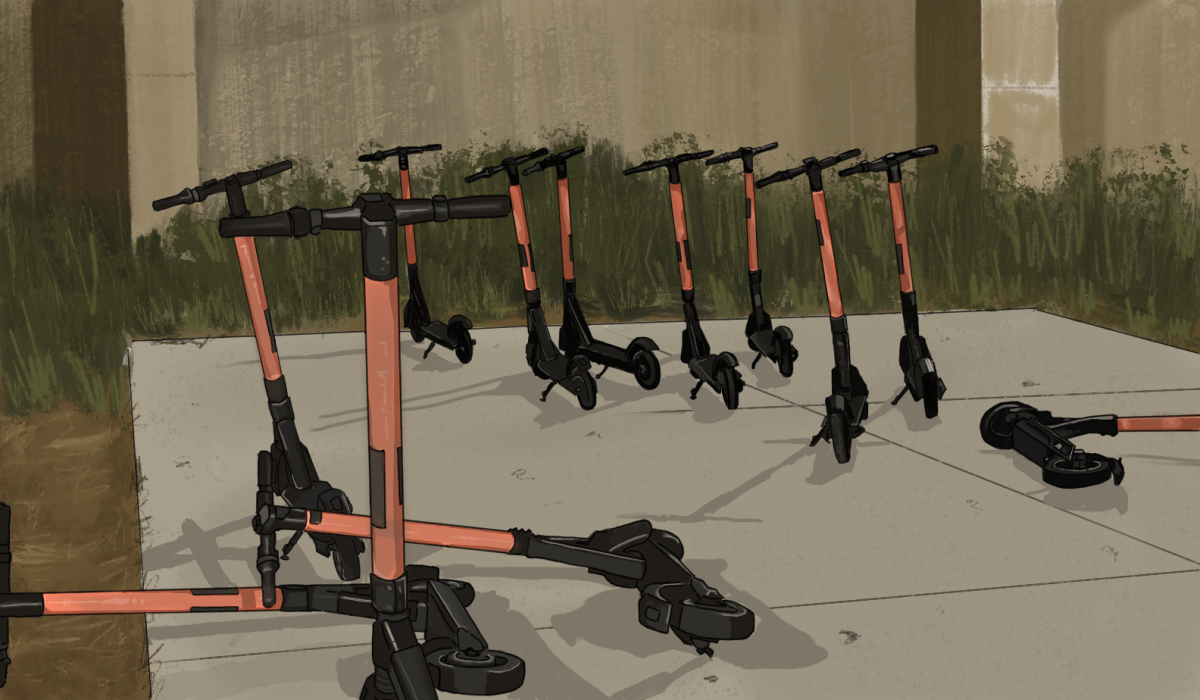In the quest for efficiency, UC San Diego — like many other universities — has woven electric scooters into the fabric of campus life. This shift, while seemingly innocuous, demands a close look at how it reshapes our campus experience, influencing not only physical health but also the subtle nuances of social interaction and mental well-being. It is a change that calls into question the balance between modern convenience and the traditional, enriching aspects of university life. This is a challenging new terrain for us as a school to navigate without losing sight of what makes a campus community thrive, and the implementation of guidelines and designated pathways could be a potential solution.
Picture the UCSD of yesteryears: paths alive with the rhythmic dance of leisurely walks that serve as more than just transit. The strolls to and from class can be the birthplace of friendships and the incubators of ideas. They are where chance encounters under the shade of eucalyptus trees can blossom into meaningful conversations. Now, contrast this with the modern scene of UCSD’s chaotic pathways. As e-scooters whirred into prominence, these vibrant hues of campus life gradually became smothered with a fleet of zipping shadows. Every scooter ride, while saving minutes, costs us a potential smile from conversation or a new thought overheard from the clubs and preachers that line the edge of Library Walk. This transformation feeds into the “UC Socially Dead” stereotype, with scooters acting as both physical and metaphorical barriers, distancing us from unplanned human connections.
From my time on campus, I have observed the effects of this new norm. Scooters have injected our campus life with an undercurrent of urgency, reminiscent of a bustling urban sprawl. The campus’ once relaxed pace, enriched with intellectual debates and lighthearted banter between classes, in many cases, is now replaced with a rush devoid of any meaningful interaction. This hurried pace, while efficient, is subtly robbing us of the joys and stress-relieving benefits of a calm, reflective walk.
An American Psychological Association article from last year highlights that adults who engage in 2.5 hours of brisk walking weekly, just a bit more than the average student’s walking time between classes, see a 25% lower risk of depression. Thus, the decline in walking is more than a loss of physical exercise; it is the relinquishing of a mental break. Opting for scooter rides over walking endangers not only our physical health but the very core of our creativity and mental well-being, essential elements of academic life.
Furthermore, it goes without saying that more vehicles on walkways means more accidents and injuries, as I have witnessed many times all around campus, especially on Library Walk. The school has done a good job of implementing bike paths around certain parts of the campus, most notably the west side, spanning from Seventh down to Revelle. However, these bike paths seem to disappear as you get closer to the middle of campus where the majority of the foot traffic lies. Not to mention, there is currently a lack of protocol for scooter riders on Library Walk and other major pathways. The seeming lack of awareness contributes to a sense of potential accident every time I walk to my class at Center Hall.
Acknowledging these concerns, some universities have already charted a course. Institutions including Fordham University and Boston University have waved goodbye to scooters, citing safety and fire hazards. Yale University has restricted their use in residential areas, while Arizona State University’s long-standing policy against scooters preserves a traditional campus atmosphere. In contrast, the University of Arizona and Oklahoma State University have taken a middle path, designating scooter zones and parking lots, striking a balance between embracing modernity and preserving campus culture.
I am not advocating for a complete banishment of scooters but rather for a revision of their integration into the tapestry of campus life. I envision a campus where the hum of scooters can only be heard in certain parts and peacefully coexist with the conversation of strolling students. Like many other tricky issues, UCSD, as a prestigious institution, should lead by example in showing how to stride into the future without losing our step. While e-scooters symbolize a nod to the future, we must ensure they do not eclipse the essence of our past and present — a blend of academic pursuit, physical well-being, and a vibrant social community.










